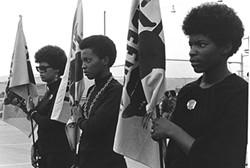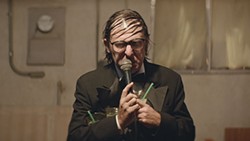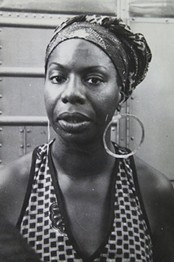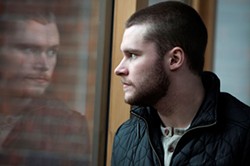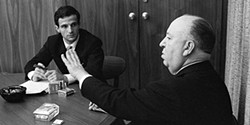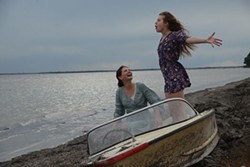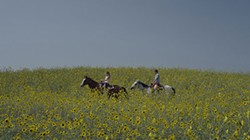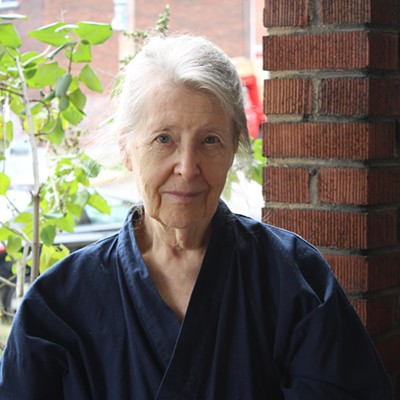The 34th annual Three Rivers Film festival starts Fri., Nov. 6, and runs through Sun., Nov. 15. More than four dozen films screen at Melwood, Harris, Regent Square and Waterworks theaters. Most tickets are $9, and complete schedule is at www.3rff.com.
Write-ups for the opening-night films are on CP’s website: Crocodile Gennadiy, This Changes Everything and Court.
Below are reviews for films screening over the weekend.
THE BLACK PANTHERS: VANGUARD OF THE REVOLUTION. It’s a smart move to open this documentary about the Black Panthers by having one participant recount the fable of the blind men and the elephant. Just as each man drew a different conclusion depending on which part of the animal he touched, so too, says the interviewee, did each Black Panther member have a different experience. It’s a given for such a sprawling organization, one that had many focuses and varying degrees of participation: Some members were imprisoned, others went to rallies; some joined to foster black pride; others to foment a violent overthrow. And it helps inoculate the film against charges that it is not comprehensive, or missed this aspect or that.
Because even at two hours, Stanley Nelson Jr.’s film functions mostly as a primer, an introduction to who, what and why the Black Panthers were. The structure is linear, beginning with the Panthers’ founding in Oakland, Calif., and moving through significant events such as the gun showdown in Sacramento, the arrest of Huey Newton, the departure of Eldridge Cleaver, the death of Fred Hampton, and the police raid on the Los Angeles office. Nelson conducts contemporary interviews with former Panthers, historians, law enforcement and assorted supporters and colleagues. And there is ample use of archival footage.
That’s a lot of basic ground to cover, but Nelson also makes an attempt to sort out what the larger social, political and culturally impacts were — for the country and for individuals. There is also an examination of how even powerful movements can get derailed, and from both external and internal forces. The story of the Panthers is a complex, fascinating one, touching on so many aspects — domestic revolution, gun control, the role of women in political movements, the tensions between violent and non-violent protests, the overreach of the police, influence on other protest movements, and so on. For those who may only know about the Panthers from a stylish photo or two, this is a good place to start. (Al Hoff) 1:30 p.m. Sat., Nov. 7, and 8:45 p.m. Wed., Nov. 11. Waterworks
IN THE SHADOW OF WOMEN. Philippe Garrel’s film dissects the relationship between a young married couple, Manon and Pierre, living in Paris. Garrel, whose formative years were during the French New Wave, uses the genre’s style in his treatment of the 2015 film. Shot in black and white, and with long cuts of Manon and Pierre’s emotional struggles, In the Shadow is visually pleasing, and like any relationship drama, keeps you wondering “Will they stay together? Will they break it off?”
More importantly, Manon and Pierre’s relationship is a laboratory of gender-specific behavior according to how men and women are socialized. What could have been accepted as maybe just relationship problems a generation or two ago are hopefully now recognized as verbal and psychological abuse. Pierre ventures outside of the marriage for pleasure, while Manon sticks by his side, maintaining their romantic partnership and working relationship on his documentary films. When Manon also seeks a lover, Pierre cannot forgive her, even after her incessant apologizing. He continues to beat down any chance of her happiness with guilt-inducing comments (i.e., “Did you fuck him like that?”). The title of the film remains a mystery because it’s clearly Manon who’s living under Pierre’s shadow. Whether watching through a psychological lens or just to see what happens to the once-happy couple, the pace and visual beauty of the film are more satisfying than its conclusion. (Ashley Murray) In French, with subtitles. 1:30 p.m. Sat., Nov. 7, and 6 p.m. Wed., Nov. 11. Regent Square
INFLUENZA. Lukasz Barczyk’s new film (Polish title: Hiszpanka) might be the strangest possible retelling of the 1918 uprising that heralded Polish independence. Briefly, the film revolves around a group of patriotic clairvoyants trying to save the famed concert pianist Paderewski — a real historical figure who symbolized the fight for a free Poland — from an evil clairvoyant hired by the Prussian Army. That the villain is portrayed by Crispin Glover set on high boil gives you some idea, but that’s just the start: Influenza (also set against the backdrop of the global flu epidemic) is a mad hothouse of séances and sorcerers, biplanes and dirigibles, mesmerism, bodily possession, a steamer journey and more, all to a soundtrack of early jazz and Chopin, with shout-outs to Kubrick and Fritz Lang. (It took me nearly an hour of the film’s two-hour running time to figure out what was going on.) Visually sumptuous, even extravagant in its recreation of wartime Poland, it feels rather like an outré sort of alternate-history graphic novel, with the dreamlike progress of its plot and a comic edge that often borders on camp. I don’t know how much history you’ll learn from Influenza, but you’re not likely to forget it. (Bill O’Driscoll) In Polish, with subtitles. 3 p.m. Sat., Nov. 7, and 7 p.m. Tue., Nov. 10. Waterworks
ENTERTAINMENT. In the opening scene of Nick Alverson’s Entertainment, the comedian, played by Gregg Turkington, kills to a full house.
The comedian, with his greasy comb-over, and grimy tuxedo, is a throwback to the long-gone Las Vegas lounge comedians who traded in off-color humor in the wee hours of the morning. In this room, he tells sophomoric, unfunny jokes about Courtney Love and Elton John, but the captive audience erupts in laughter.
Unfortunately, the room is a county prison in the middle of the Mojave Desert, and the laughing inmates are a high point for the film’s protagonist. Entertainment is a grim, dark journey into the life of a smaller-than-small-time road comedian who has long lost his humanity, and is on the fast track to losing his mind.
Despite wanting to look away, you can’t. You’re in the middle of this unraveling and Alverson delivers a methodically paced film that makes it impossible for you to abandon him. Why? Because things are so mundanely bad for this person that you are sure that his salvation lies just around the next corner — in the next club, or the next shitty motel room. He plants seeds of hope around the way — a beautiful woman here, a dream gig there. You’re sure it’s the thing he needs to right the ship before it capsizes in the sea of despair that he’s trying to navigate.
Turkington will be instantly recognizable to some, as the comedian he plays here is an almost carbon copy of his lounge-comedian act, Neil Hamburger. While he’s able to communicate and do his act on-stage, offstage he’s an uncommunicative mess who can’t have a real relationship with anyone.
The movie is dark and depressing, but comes with just enough great moments to hold the whole thing together. John C. Reilly plays the comedian’s cousin, a farmer who reconnects with him at one of his shows. Reilly really is a great actor, especially with material that’s weird and off-center, and he doesn’t disappoint here. He provides an unexpected musical interlude that goes down as the film’s best moment. Actress Amy Seimetz provides another great moment in the film, as an audience member pushed too far by a dressing-dwon from the comedian.
Entertainment is a tough film to watch, but like Turkington’s comedian, you should keep moving forward and stick it out to the end — no matter how bad things get. (Charlie Deitch) 3 p.m. Sat., Nov. 7, and 6 p.m. Thu., Nov. 12. Harris
THE AMAZING NINA SIMONE. “I’ll tell you what freedom is to me: no fear!” says Nina Simone in an archival interview in Jeff L. Lieberman’s new documentary. The singer, pianist and songwriter scored her first hit in 1959, with her rendition of “I Love You Porgy.” But her subsequent career is as worthy of its own feature-length doc as was her unlikely path to fame, and it was all a testament to her seeming fearlessness. Simone was born Eunice Waymon, in rural North Carolina, and even fans might not know she began her musical life in the Jim Crow South as a classical-piano prodigy, later studying at Julliard. She began singing in the early ’50s only in order to land the piano gig at an Atlantic City bar, and over the next decade rose to fame as a powerful performer with a glamorous but forthright stage presence. Her goal was to be “as honest as I can be,” and as her political awareness grew (partly thanks to friendships with James Baldwin, Langston Hughes and Lorraine Hansberry), she was honest and more with protest songs like 1964’s “Mississippi Goddam.”
Lieberman (who also narrates) credits Simone as a herald of black self-acceptance and empowerment, with songs like “Four Women,” her embrace of Africa and the sobriquet “High Priestess of Soul.” Interview subjects range from childhood friends (and Simone’s high school principal!) to her brothers and longtime bandmates. But the film doesn’t stint on Simone’s troubled side, from her growing tendency to walk out on shows to her struggle with bipolar disorder. (Her brother and bandmate Sam Waymon claims that Simone had seven distinct personalities and suffered from “demonic possession.”) But her low points in the 1970s and ’80s preceded a 1990s revival, and if you want to understand why Simone is a cultural icon, The Amazing Nina Simone is a fine place to start. (BO) 8 p.m. Sat., Nov. 7, and 2 p.m. Sun., Nov. 8. Harris. Director Jeff L. Lieberman is scheduled to attend both screenings.
GLASSLAND. Noise and light are sparse throughout the first third of Gerard Barrett’s bleak, but beautiful new film. They’re doled out with restraint, like waning resources: no music, not much dialogue, dark rooms built for hangovers, and interior shots perpetually backlit by harsh gray Dublin daylight. It sounds dreary, and it is, yet Glassland’s powerful emotional core shines through the muck, thanks primarily to its two principal actors and the confident minimalism that carries through its 90-minute runtime.
Jack Reynor plays John, a twentysomething taxi driver who seems much, much older than that, aged by a lifetime of looking after his alcoholic mother, Jean, played with alternating fragility and ferocity by Toni Collette. John’s father is long gone, and his younger brother who has Down syndrome, lives elsewhere, leaving John and Jean to fill out the family on their own. John works and worries; Jean drinks.
The central crux of the story focuses on John’s efforts to get Jean into treatment, and the complicated way the two depend on and resent one other. But the film is also populated and empowered by wonderful secondary players like John’s dopey-sweet pal, Shane (Will Poulter), and an avuncular alcohol counselor played by Michael Smiley. There are side stories that, with a different director and script, would seem forced and unnecessary, but here they manage to feel organic.
Glassland is definitely minimal during its first third — and much of its second act — but as a result, little is superfluous. Every word weighs a ton and every interaction is alive. Though it is not in any sense a fun movie to watch, there is real joy in this film. Also profound misery, disease and bitterness, but beneath it all, Glassland is a hopeful endeavor. (Alex Gordon) 3 p.m. Sun., Nov. 8, and 4:15 p.m. Thu., Nov. 12. Waterworks
HITCHCOCK/TRUFFAUT. Hard to believe now, when he’s acclaimed as an iconic artist, but 50 years ago, Alfred Hitchcock was widely seen as merely a highly successful light entertainer. Film writer Kent Jones’ new documentary recounts the exact moment that began to change. In 1962, French New Wave wunderkind Francois Truffaut instigated a series of conversations with his hero Hitchcock about each of the older man’s films. The transcriptions, supplemented by stills from those films arrayed storyboard-style, became a 1966 book that has influenced generations of filmmakers and, not coincidentally, helped reform the critical view of Hitch as a groundbreaking auteur.
Jones’ cinephile’s-dream doc recaps those long-ago conversations at Universal Studios (which were facilitated by a translator), including charming still photos and liberal doses of original audio. Contemporary directors weigh in on both Hitchcock and the Hitchcock/Truffaut book, from Martin Scorsese and Peter Bogdanovich to David Fincher, Wes Anderson, Richard Linklater, Oliver Assayas and Kiyoshi Kurosawa. The documentary explores how Hitchcock’s films played with the experience of time and privileged plot over character development, and also how he handled actors. (You’ll hear his famous quote “Actors are cattle” — a reminder that, in many respects, ironically enough, Hitchcock’s hypercontrolling approach was almost exactly opposite that of the improv-friendly Truffaut.) Extended consideration is given to both Vertigo, which exemplifies Hitchcock’s theme of erotic obsession, and Psycho, which demonstrated both his eagerness to surprise audiences and his willingness to subvert cinematic convention (with, for instance, the lengthy narrative misdirection that opens that 1960 classic). You might also be pleased to learn that those 1960s conversations created a lifelong bond of friendship between Hitch and Truffaut. (BO) 5:30 p.m. Sun., Nov. 8, and 4:15 p.m. Wed., Nov. 11. Waterworks
BREATHE. Based on the popular young adult novel by Anne-Sophie Brasme, Breathe has all the trappings of a standard coming-of-age story: beautiful high school students, tumultuous parental relationships, sexual anxiety and scenes that look like they were shot through the Valencia Instagram filter. Studious Charlie (played with wide-eyed stoicism by Josephine Japy) meets Sarah, the new girl at school, and the two quickly become inseparable. Sarah (Lou de Laage) is funny, wild and beautiful, and because her mother works for an NGO in Africa, she’s been everywhere and done everything. But as time goes on, cracks begin to show, and stories don’t add up. As Sarah’s behavior towards Charlie becomes erratic and even cruel, Charlie’s fixation on Sarah deepens.
Directed by Mélanie Laurent — who Americans will know better for her role as Shosanna in Inglorious Bastards — Breathe, on one hand, serves as an interesting study of the romantic intensity that can develop in platonic female friendships. On the other hand, it’s a horror show of manipulation and abuse. The thematic exposition can be a bit on-the-nose. (Early on, a teacher tells his students, “Passion is harmful when it becomes excessive, which is most of the time.”) But an enthralling tension carries the quietly told story forward, and viewers are unlikely to forget the final scene any time soon. (Margaret Welsh) In French, with subtitles. 7 p.m. Sun., Nov. 8, and 2 p.m. Wed., Nov. 11. Waterworks.
TAKE ME TO THE RIVER. California teenager Ryder (Logan Miller) and his parents travel to Nebraska for a family get-together at the old rural homestead. Ryder is out at home, but his mom (Robin Weigert) cautions him to keep his homosexuality a secret at the gathering. But Ryder still raises eyebrows when he hits the picnic in shorty shorts and kicky sunglasses.
He finds an ally of sorts in his playful 9-year-old cousin, Molly. But when Molly suffers a minor injury while in Ryder care, Molly’s dad, Keith, turns angry and ugly. But, in Matt Sobel’s domestic drama, that anger isn’t half as creepy and unnerving as the reconciliation Keith forces on Ryder. A slow-burner about family dysfunction and long-kept secrets that feels even more disturbing when set against the sunny backdrop of an all-American farmstead. (AH) 9 p.m. Sun., Nov. 8, and 2 p.m. Thu., Nov. 12. Waterworks.

